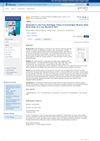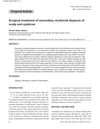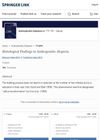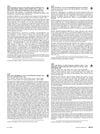 14 citations,
January 2013 in “Journal of Cutaneous Medicine and Surgery”
14 citations,
January 2013 in “Journal of Cutaneous Medicine and Surgery” Some cancer treatments can cause permanent hair loss.
 10 citations,
January 2016 in “Dermatology”
10 citations,
January 2016 in “Dermatology” Psoriasis lesions have fewer and smaller oil glands, which might affect the condition's development.
 1 citations,
May 2021 in “Revista Eletrônica Acervo Científico”
1 citations,
May 2021 in “Revista Eletrônica Acervo Científico” The document concludes that more research is needed on treatments for hair loss in both men and women, especially on medication combinations and their benefits.

Injectable PRF therapy may help with hair growth and skin rejuvenation, but more research is needed.
 January 2024 in “Experimental and clinical endocrinology & diabetes”
January 2024 in “Experimental and clinical endocrinology & diabetes” A low-glycemic diet improved hormone levels and well-being in overweight women with high androgen levels.
 January 2009 in “Indian Journal of Plastic Surgery”
January 2009 in “Indian Journal of Plastic Surgery” Surgical methods for hair loss due to scarring should be chosen based on the size, location, and shape of the area, with most patients seeing good results.
September 2013 in “International Journal of Dermatology and Venereology” Effective treatments for hair loss are a major focus in dermatology.
 30 citations,
January 1997 in “Journal of Dermatological Treatment”
30 citations,
January 1997 in “Journal of Dermatological Treatment” Topical finasteride helps regrow hair and reduce balding without side effects.
 4 citations,
June 2005 in “British Journal of Dermatology”
4 citations,
June 2005 in “British Journal of Dermatology” People often underestimate hair loss severity, with fewer seeking treatment, and it's more distressing for women.
 1 citations,
January 2011 in “The annals of clinical and analytical medicine”
1 citations,
January 2011 in “The annals of clinical and analytical medicine” Hair mesotherapy showed improvement in hair growth and thickness without side effects.
The serum is safe and effective for treating hair loss.
 January 2023 in “Dermatologic Therapy”
January 2023 in “Dermatologic Therapy” The nutritional supplement Pilopeptan® WOMAN improved hair growth and thickness in women with hair loss.
 March 2021 in “Indian Journal of Dermatology”
March 2021 in “Indian Journal of Dermatology” A man unhappy with his old hair restoration got a new, natural-looking hairline using a combination of follicular unit extraction and punch graft reduction.
 November 2019 in “Neuro-oncology”
November 2019 in “Neuro-oncology” Rind-based techniques can lower scalp radiation dose and reduce hair loss in brain cancer treatment.
Dr. SKS Hair Booster Serum is safe and effective for reducing hair fall and promoting hair growth.
 25 citations,
July 2020 in “Journal of cosmetic dermatology”
25 citations,
July 2020 in “Journal of cosmetic dermatology” Deoxycholic acid is effective for reducing chin fat but can cause side effects and serious complications, so careful patient evaluation is needed.
 12 citations,
November 2020 in “Journal of Dermatological Science”
12 citations,
November 2020 in “Journal of Dermatological Science” Found microRNA differences in hair cells, suggesting potential treatment targets for hair loss.
 July 2020 in “bioRxiv (Cold Spring Harbor Laboratory)”
July 2020 in “bioRxiv (Cold Spring Harbor Laboratory)” The structure of SRD5A reveals how it reduces steroids, aiding drug design for related health conditions.
 January 1996 in “Springer eBooks”
January 1996 in “Springer eBooks” Balding doesn't reduce the number of hair follicles, it just makes them smaller.
 May 2017 in “Journal of The American Academy of Dermatology”
May 2017 in “Journal of The American Academy of Dermatology” The treatment increased hair follicle counts and is potentially effective for male hair loss without serious side effects.
 42 citations,
November 2018 in “Archives of dermatological research”
42 citations,
November 2018 in “Archives of dermatological research” Apremilast was not effective in treating moderate-to-severe alopecia areata.
35 citations,
August 2009 in “Journal of the American Academy of Dermatology” Melanocytes might be targeted by the immune system in people with alopecia areata, but more research is needed.
 23 citations,
June 1976 in “PubMed”
23 citations,
June 1976 in “PubMed” Crash dieting can cause temporary hair loss due to not getting enough energy for hair growth.
9 citations,
January 2019 in “International Journal of Trichology” Combining calcipotriol with mometasone is more effective for treating alopecia areata than using mometasone alone.
 3 citations,
June 2023 in “Journal of dermatological treatment”
3 citations,
June 2023 in “Journal of dermatological treatment” Regrowing scalp hair improves quality of life and reduces anxiety and depression in severe alopecia areata patients.
 February 2025 in “International Journal of STD & AIDS”
February 2025 in “International Journal of STD & AIDS” Tofacitinib can cause unusual hair growth, requiring careful monitoring and possible laser hair removal.
 August 2024 in “Clinical Cosmetic and Investigational Dermatology”
August 2024 in “Clinical Cosmetic and Investigational Dermatology” Upadacitinib and narrowband UVB effectively treated a child's vitiligo and alopecia areata.
 June 2024 in “Australasian Journal of Dermatology”
June 2024 in “Australasian Journal of Dermatology” Tofacitinib is safe and effective for treating moderate-to-severe alopecia areata.
 June 2024 in “IP Indian journal of clinical and experimental dermatology”
June 2024 in “IP Indian journal of clinical and experimental dermatology” PRP therapy effectively treats alopecia areata and atrophic acne scars.
 June 2023 in “Journal of Cosmetic Dermatology”
June 2023 in “Journal of Cosmetic Dermatology” The treatment combining platelet-rich plasma and a non-cross-linked hyaluronic acid compound significantly improved hair density and reduced bald areas in women with androgenetic alopecia, and it's safe with only mild side effects.

























